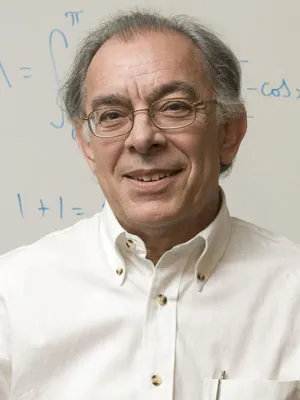
Dr. Jorge Sarmiento
Academic Rank:
Professor
Department:
Mathematics
School:
Business, Mathematics, Engineering & Technologies
Office: SH 215
Phone: 973-328-5719
Email: jsarmiento@ccm.edu
Education: D.A., University of Miami, M.A., University of Puerto Rico, B.E.E., University of Gijon (E.I.T.I.) Spain, B.S., International Institute of the Americas, Puerto Rico, A.A.S., County College of Morris
Professor Jorge Sarmiento, Doctor of Arts in Mathematics, values logic. It’s a bit ironic given that his path to teaching was guided through chance by two nuns, 3,000 miles away from his native Spain. Born in the mountainous region of Asturias, in northern Spain, he studied electrical engineering.
“I moved to Puerto Rico in search of a job,” he says. There he took an English class with two Dominican nuns. They befriended him, offering him a teaching job at their college, Our Lady of Lourdes. He found it so enjoyable that he switched careers, pursuing a master’s and then a doctorate in mathematics, followed by teaching at universities in Puerto Rico.
In the late 1980s, the Lawrence Berkeley National Laboratory at the University of California, Berkeley offered him three internships, during which he conducted research and published articles in applied mathematics. In 1989, an exchange program brought him to Montclair State University. He liked New Jersey, so he applied to work at County College of Morris (CCM).
“I thought I’d stay three to four years until my children graduated from high school,” he says. Somehow that timeframe expanded into 21 years.
He derives satisfaction in teaching the joy of math. “When I hear people say, ‘I’d like to be an engineer, but I’m not good at math,’ then they take a few courses and change their minds; that is very rewarding,” he says. “The challenge is bringing together several levels of students and reaching them all without losing anyone. You have to mix psychology with mathematics.” He recently applied that philosophy as a fellow in the Mid-Career Fellowship Program (MCFP), sponsored by Princeton University.
“In mathematics, up to two thirds of freshmen take at least one remedial course and around half fail. My proposal addressed the problem with short but comprehensive modules.” He tested his theories this past spring in classes. They also were published by the McGraw Center at Princeton University and distributed to all colleges participating in the MCFP program.
Dr.Sarmiento says his students have also taught him some valuable lessons. “I learned to be more sensitive. They bring me back to reality. You cannot separate their personal lives and problems from what you’re teaching. It’s important to mix the human component with the math.”